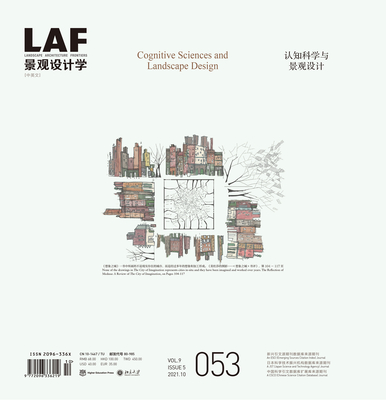Landscape Architecture Frontiers 053: Cognitive Sciences and Landscape Design

Landscape Architecture Frontiers 053: Cognitive Sciences and Landscape Design
Cognitive sciences that aim at establishing scientific and explicit interpretations can diversify approaches to exploring users' feelings and experiences of a specific environment. For example, people's emotions and feelings change with their environment, closely related to people's sensory processes and brain wiring, personal experiences, and visiting purposes, etc., can be understood as a prompt intuitive response.
Environmental information and responses are processed very fast to support quick decision making in relation to people's survival and benefits. Environmental Psychology explains the environmental types people prefer and why certain environments make people feel, for example, anxious or excited. Understanding people's emotional responses to the environment facilitates, or "nudges" (a term usually used in the inter-discipline of Psychology and Behavioral Economics), users to act or make choices as desired. Moreover, research on attention in cognitive sciences can also inform designers: by controlling the spatial elements and intangible elements (such as light and sound) to minimize environmental disturbance or noise, users' attention can be directed to specific elements, element combinations or series. During this process, users' specific emotional memories or symbolic implications are activated, which augments desired feelings and experiences.
This issue explores the mechanism of how landscape design affects users' feelings, experiences, and behaviors, as well as usability, by introducing theories, knowledge, and research methods and findings in Cognitive sciences, psychology, neurobiology, and computer science, so as to support landscape architects' decision making.
PRP: 257.83 Lei
Acesta este Pretul Recomandat de Producator. Pretul de vanzare al produsului este afisat mai jos.
232.05Lei
232.05Lei
257.83 LeiIndisponibil
Descrierea produsului
Cognitive sciences that aim at establishing scientific and explicit interpretations can diversify approaches to exploring users' feelings and experiences of a specific environment. For example, people's emotions and feelings change with their environment, closely related to people's sensory processes and brain wiring, personal experiences, and visiting purposes, etc., can be understood as a prompt intuitive response.
Environmental information and responses are processed very fast to support quick decision making in relation to people's survival and benefits. Environmental Psychology explains the environmental types people prefer and why certain environments make people feel, for example, anxious or excited. Understanding people's emotional responses to the environment facilitates, or "nudges" (a term usually used in the inter-discipline of Psychology and Behavioral Economics), users to act or make choices as desired. Moreover, research on attention in cognitive sciences can also inform designers: by controlling the spatial elements and intangible elements (such as light and sound) to minimize environmental disturbance or noise, users' attention can be directed to specific elements, element combinations or series. During this process, users' specific emotional memories or symbolic implications are activated, which augments desired feelings and experiences.
This issue explores the mechanism of how landscape design affects users' feelings, experiences, and behaviors, as well as usability, by introducing theories, knowledge, and research methods and findings in Cognitive sciences, psychology, neurobiology, and computer science, so as to support landscape architects' decision making.
Detaliile produsului








